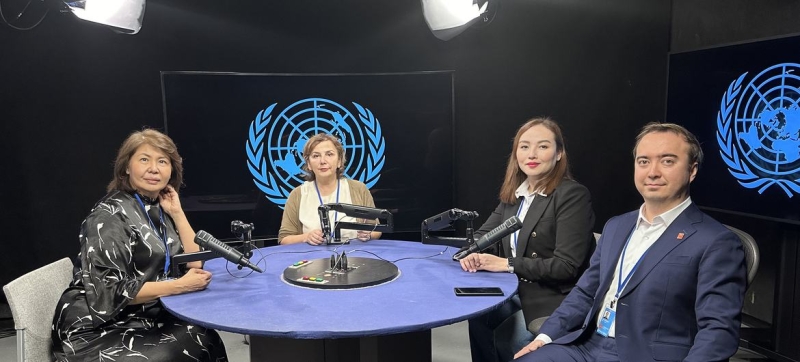
In the photo (from left to right): Aida Alzhanova, Nargis Shekinskaya (UN News Service), Zhanna Urazbakhova, Muslim Khasenov. The “Saltanat case” and the criminalization of domestic violence in Kazakhstan: human rights activists call for tougher laws Human Rights
An event dedicated to the role of civil society in the criminalization of domestic violence in Kazakhstan was held on the sidelines of the 79th session of the UN General Assembly on Tuesday. The broad public campaign was prompted, among other things, by the reaction to the murder of his wife Saltanat Nukeeva by former Minister Kuandyk Bishimbayev.
The UN News Service wrote about this high-profile case, dubbed the “Saltanat Case,” and monitored the debate on tightening the legislation in the Kazakh parliament.
In the UN News studio, participants in the event, activists and human rights defenders from Kazakhstan spoke about the obstacles they had to overcome, noting that this was “only the first step” in the fight against gender-based violence. Guests of the UN News studio in New York were human rights defender Aida Alzhanova, lawyer and activist Zhanna Urazbakhova, who participated in the trial of Saltanat Nukenova’s murder, and Associate Professor of Maksut Narikbayev University, Doctor of Law Muslim Khasenov. Alzhanova and Khasenov were members of the parliamentary working group that was developing legislation to criminalize domestic violence.
Saltanat’s case literally blew up society. People were shocked by the circumstances of the young woman’s murder and demanded not only that the culprit be punished, but that all women be protected from such violence.
“The decisive role was played by civil society, which united in November after the tragic events associated with the murder of Nukenova,” said lawyer Urazbakhova. “This was, in particular, a petition that collected 150 thousand signatures. Each signature was verified. For the first time, a petition on any issue literally in a matter of days collected such a huge number of supporters.”
After decriminalization, a fine could be imposed for beating, which was less than for abuse of pets
In Kazakhstan, domestic violence was previously subject to criminal punishment, but it was abolished in 2017. “After decriminalization, beatings could result in a fine that was less than for animal abuse,” recalls Aida Alzhanova. “And since 2017, we have been knocking on every door endlessly.”
In general, according to UN News Service sources, a significant number of men in Kazakhstan believe that domestic violence is “mainly the fault of women who do not watch their language.” Such statements, human rights activists shared, can even be heard from MPs.
“The new version of the bill was developed in the middle of last year, but the government opposed criminalization,” Muslim Khasenov emphasized. After Saltanat’s murder and a broad public campaign, the authorities supported the changes. “The president issued a decree on a priority action plan in the field of human rights, which clearly spelled out the point on criminalization [of domestic violence]. And that’s it. And the government immediately had, as they say, carte blanche, a direct order from the president, which they carried out in January and submitted the bill [for consideration by parliament],” he added.
But the path was still thorny. Opponents of the amendments spread disinformation that might seem absurd, but fell on fertile ground and was picked up by many social media users. But the bill was adopted.
Many human rights activists consider it too soft, “toothless”, many do not like the name. “But we decided that such a law is better than no law at all. Let this be the first step,” Alzhanova added.
Violence is first born in the mind, and only then does it develop into physical violence
Activists highly appreciate the support of UN agencies in the fight for women’s rights in Kazakhstan. “We are very grateful to the UN for its support,” Muslim Khasenov said. “I would like to especially note the work of the treaty bodies. UN committees always provide very specific, very constructive recommendations on each report of Kazakhstan within the framework of various conventions.”
He added that today Kazakhstan does not have a framework legislation to combat discrimination. “And this is where the fight against violence should begin,” Khasenov said. – Violence is born first in the mind, and only then does it turn into physical violence. So the work continues.”
Listen to the full version of the conversation with Kazakhstani human rights activists in audio format.
